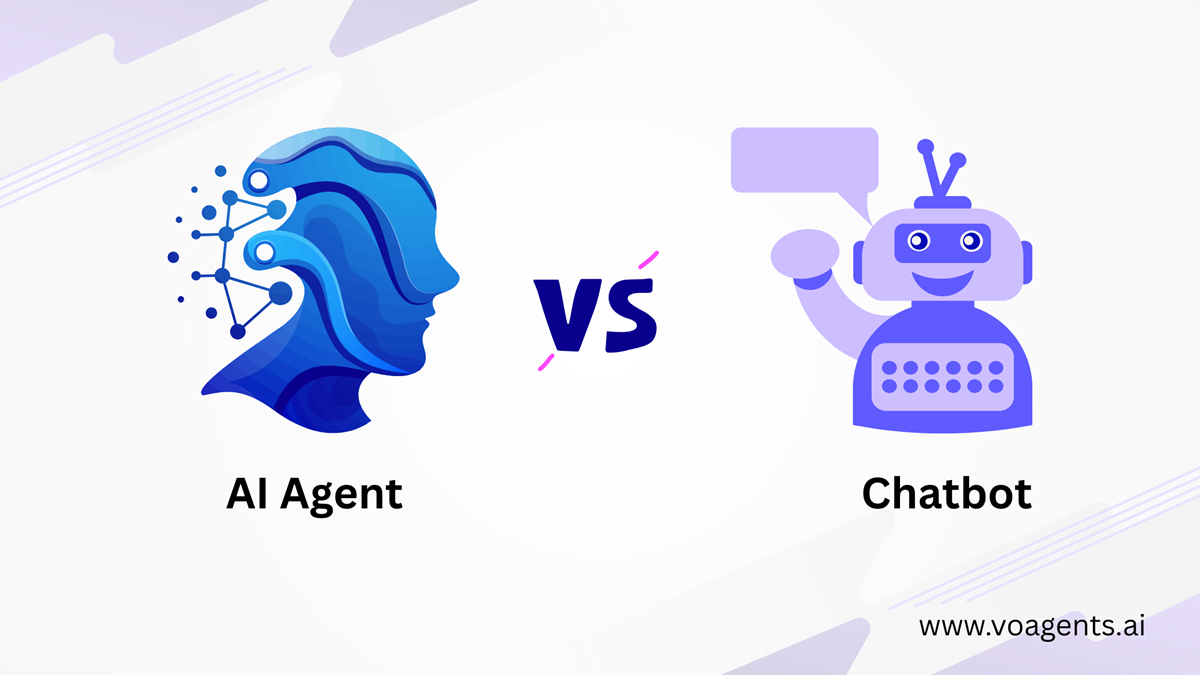With the rise of automation in customer communication, businesses today face a key decision: should they invest in a Voice AI agent or a chatbot?
While both technologies fall under the umbrella of conversational AI, they serve different purposes and deliver distinct experiences.
This blog will walk you through a practical breakdown of voice AI vs chatbot, helping you choose the right solution for your business.
Understanding the Basics
What is a Voice AI Agent?
A Voice AI agent is a conversational system that interacts with users over the phone using voice. It uses speech recognition, natural language understanding, and voice synthesis to carry out real-time conversations.
These agents can make outbound calls, answer incoming ones, book and schedule appointments, or resolve queries with minimal human oversight.
What is a Chatbot?
A chatbot, on the other hand, is a text-based AI system that engages users via a chat interface on websites, apps, or social media platforms. While chatbots can answer questions and offer quick replies, they are limited to typed text and often struggle with context beyond basic FAQ scenarios.
Voice AI vs Chatbot: Key Differences
| Feature | Voice AI Agent | Chatbot |
| Interaction Mode | Spoken conversation via phone | Text-based messaging via web/apps |
| Availability | 24/7, even during off-hours | 24/7, but limited by user’s typing comfort |
| Real-Time Scheduling | Yes, with calendar integration | Usually redirects to forms or external calendars |
| Human-Like Communication | High – mimics real human phone agents | Moderate – scripted or button-based flows |
| Use Case Fit | Inbound/outbound calls, appointment booking | FAQ, basic support, lead capture |
| Best Suited For | Service industries, healthcare, real estate, etc. | Ecommerce, SaaS onboarding, website help widgets |
Which One Handles Customers Better?
If your customer communication happens mainly over the phone—say in healthcare, real estate, or auto services—AI voice assistant vs chatbot is not even a fair fight. Voice agents provide:
- Faster issue resolution
- Higher accessibility (especially for users who can’t type)
- A more personal experience
They can understand tone, emotion, and urgency—something chatbots often miss.
For instance, imagine someone calling to book a dentist appointment. A voice AI agent can handle that in under a minute, including confirmation and rescheduling if needed.
Meanwhile, a chatbot would likely send links, buttons, or redirect to a calendar page—not ideal when your hands are full or you’re on the move.
Industry Use Cases
Let’s break down the choice by industry:
1. Healthcare
- Voice AI: Voice assistant for healthcare can handles appointment scheduling, reminders, and prescription refill requests. Great for patient communication.
- Chatbot: Limited to basic symptom checks or form filling.
Winner: Voice AI
2. Real Estate
- Voice AI: Manages property inquiries, schedules showings, and follows up with prospects.
- Chatbot: Handles initial queries and lead collection via websites.
Winner: Voice AI for Real Estate
3. Ecommerce
- Voice AI: Less common but can help with voice ordering.
- Chatbot: Excellent for order tracking, returns, and product FAQs.
Winner: Chatbot
4. Customer Support
- Voice AI: Handles high volumes of calls, escalates when needed.
- Chatbot: Great for tier-1 support through live chat.
Winner: Depends on user behavior. Many use both.
The Hidden Cost of Choosing Wrong
Picking the wrong solution can create friction, delay issue resolution, and cost you customers. If your users prefer to talk, forcing them to chat isn’t just annoying—it hurts your brand.
- According to a 2023 Statista report, only 22% of users were fully satisfied with chatbot interactions, whereas voice AI scored a 2x higher satisfaction rate in phone-based industries.
When Voice AI and Chatbots Work Together
You don’t always have to choose. Many businesses integrate both for a seamless experience:
- Chatbot on the website to handle typing users
- AI voice agent on the phone to handle callers
This hybrid model ensures you’re covering all communication preferences.
By using an ai voice agent platform like VoAgents.AI, you can integrate voice support while keeping existing chatbot tools in place.
Voice AI is More Than Just a Call Handler
Modern voice AI systems offer advanced features such as:
- Natural language processing for complex queries
- Smart routing to live agents
- Calendar and CRM integrations
- Multilingual support
It’s more than just talking—it’s smart automation designed to automate customer support while sounding truly human.
Final Verdict: Voice AI or Chatbot?
If your customer journey relies on real-time, human-like interaction—especially through phones—voice AI is a smarter choice. Chatbots still have their place in text-heavy platforms, but they lack the personal, responsive feel that AI voice assistants bring.
Here’s a quick decision guide:
- Choose Voice AI if: Your business handles phone calls regularly, books appointments, or serves less tech-savvy customers.
- Choose Chatbots if: You mainly operate online, handle quick FAQs, or need a basic lead capture tool.
Looking for a full voice assistant integration? We can help you set up a system that handles everything from scheduling to customer queries—with zero wait times.
Need help deciding what’s right for your team? Connect with our experts to find the best blend of voice and text automation for your business.
Explore our powerful ai voice agent platform and see how it can automate customer support while maintaining a natural, conversational experience.
For more insights, check out our blog on voice assistant integration and how businesses are making the switch to AI-powered calling.




